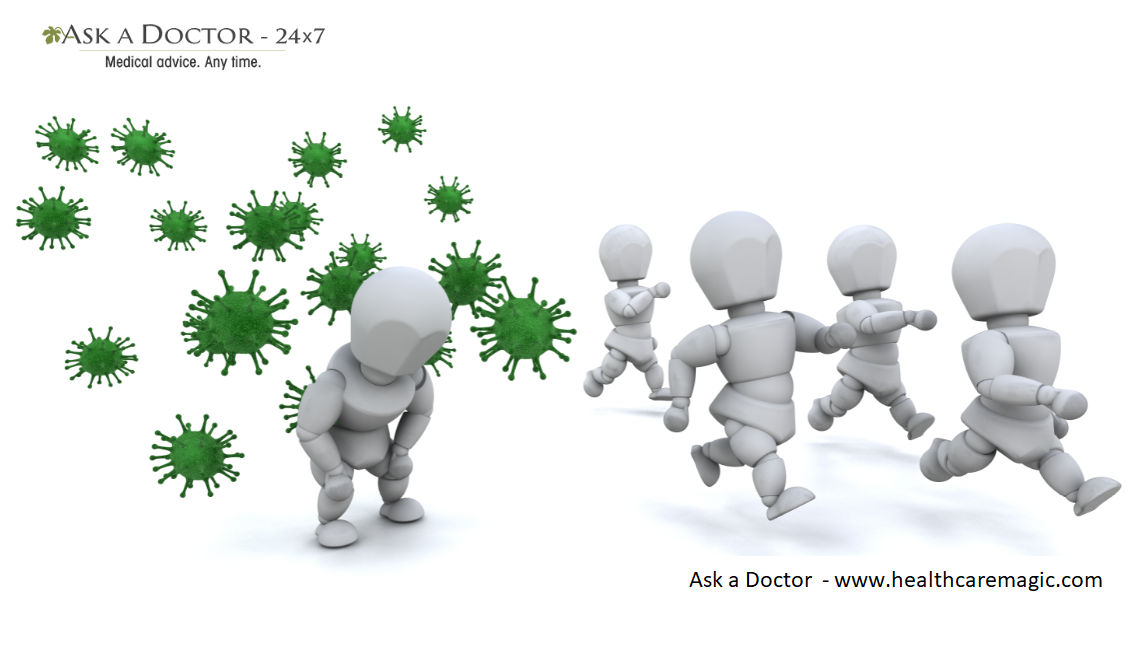Human coronaviruses are commonly found and seven types of coronavirus infect people and cause sickness. Most of the diseases caused by coronavirus are mild to moderate in severity.
Human coronaviruses are commonly found and seven types of coronavirus infect people and cause sickness. Most of the diseases caused by coronavirus are mild to moderate in severity. Common human coronaviruses causing mild illness include 229E, NL63, OC43, and HKU1. However two newly discovered coronavirus namely MERS-CoV and SARS-CoV are found to cause severe illness in humans. MERS-CoV means Middle East Respiratory Syndrome and SARS-CoV Severe Acute Respiratory Syndrome. A newer strain called nCoV (Novel Coronavirus) has also been identified.
When can human coronavirus infection happen?
Human coronaviruses frequently cause infection during fall and winter months, however the infection may happen during any time of year. A person may get infected with different types of coronavirus during different times of their life. Children are more likely to get infected with coronavirus.
How can human coronavirus transmit?
Human coronaviruses can spread from human to human or animal to human. Human to human transmission of coronavirus is more common. This transmission happens through air by sneezing, close personal contact, shaking hands, touching nose and face of infected person. Animal to human transmission has been found to cause MERS-CoV and SARS-CoV. SARS-CoV was found to be transmitted from civet cats to humans and MERS-CoV was found to be transmitted from dromedary camels to humans.
What is Wuhan Coronavirus?
Wuhan Coronavirus is a novel coronavirus – that means this type of virus has never been encountered before. Like other coronaviruses, it has been transmitted from animals to humans. It is also known to transmit from human to human. Most of the infected people have some exposure to Huanan seafood wholesale market in Wuhan city where live and newly slaughtered animals are also sold. This virus causes pneumonia that produces symptoms of cough, fever and breathing difficulties. In severe cases there can be organ failure and the person may just get unconscious.
What are symptoms of coronavirus infection?
Coronavirus infection in humans causes symptoms similar to common cold.
Common signs of infection include respiratory symptoms, fever, cough, runny nose, sore throat, shortness of breath and breathing difficulties. In mild cases the illness lasts for only a few days.
Sometimes the infection may spread to lungs and cause pneumonia, severe acute respiratory syndrome, kidney failure and even death. MERS-CoV and SARS-CoV have been known to cause severe symptoms. MERS symptoms usually include fever, cough, shortness of breath. pneumonia. It causes death in 3 or 4 out of every 10 patients. SARS symptoms include fever, chills, and body aches, pneumonia but its cases have not been reported since 2004. Risk factors for severe symptoms include cardiopulmonary disease, weak immunity, infants, and older adults.
How to prevent transmission of coronavirus?
Standard preventive measures need to be taken including regular hand washing for atleast 20 seconds, covering hand and mouth with Standard recommendations to prevent infection spread include regular hand washing, covering mouth and nose with a mask at all times, thoroughly cooking meats, avoid touching and any close contact with infected person, stay home during illness. Vaccines are not available to protect from this infection.
Ask A Doctor if you have symptoms and you recently had exposure to animals or animal products or travelled to endemic areas like China and Arabian Peninsula.
How to diagnose and treat coronavirus?
Ask A Doctor if you need laboratory tests to detect human coronaviruses. Doctor may do radiology and serology testing to confirm diagnosis especially if suspected of having a severe type of coronavirus. Since it’s a virus, antibiotics will have no effect on it. Medicines for fever and cough, room humidifier, plenty of fluids, and adequate rest are needed. Most cases recover by themselves.





